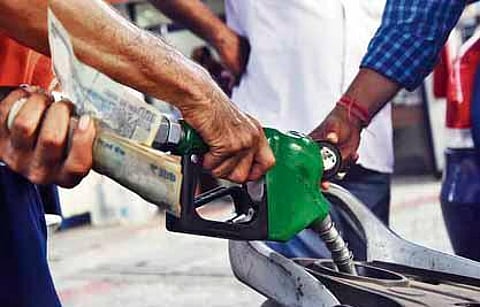

NEW DELHI: With the forthcoming high stake assembly elections in states like Uttar Pradesh and Punjab, the freeze on petrol and diesel prices is now the longest ever even as international oil prices climbed to USD 90 per barrel for the first time in seven years.
Brent - the key global oil benchmark - soared to USD 90.02 per barrel on Thursday amid tensions between Ukraine and Russia, the world's second-largest oil producer that have fanned fears of energy supply disruptions to Europe.
Analysts expected weaker Omicron impact to keep prices elevated. But domestic fuel prices - which are directly linked to international oil prices - have not been revised for 83 days now, beating the 82-day hiatus of 2020.
Petrol costs Rs 95.41 a litre in Delhi and diesel is priced at Rs 86.67 - the same as it did after accounting for the excise duty cut and a reduction in VAT rate by the Delhi government. The basket of crude oil that India buys averaged USD 88.23 per barrel on January 26, according to Oil Ministry's Petroleum Planning and Analysis Cell.
The Indian basket was at USD 74.85 in October 2021, USD 74.47 in the following month and USD 75.34 in December, according to PPAC. Prior to tax reductions, petrol price had touched an all-time high of Rs 110.04 a litre and diesel came for Rs 98.42.
These rates corresponded to Brent soaring to a peak of USD 86.40 per barrel on October 26, 2021. Brent was USD 82.74 on November 5, 2021, before it started to fall and touched USD 68.87 a barrel in December.
Prices, however, started to rise thereafter and on Thursday soared to USD 90 per barrel - the highest since 2014. Petrol and diesel prices have been frozen in the past before crucial elections but the current 83-day hiatus is the longest since daily fuel price revision was adopted in June 2017.
Prior to this, there was a 82-day hiatus in rate revision between March 17, 2020 and June 6, 2020. Voting to elect new state governments in Uttar Pradesh, Punjab, Goa, Manipur and Uttarakhand is to begin on February 10 and results would be announced on March 10 and an increase in fuel prices is unlikely before that, industry sources said.
A reduction in rate, if warranted by fall in international oil prices, is possible but not an increase, they said. The 82-day hiatus in rate revision in 2020 followed the government raising excise duty on petrol and diesel by Rs 3 per litre each to mop up gains arising from falling international rates.
The government on May 6, 2020, again raised excise duties by Rs 10 per litre on petrol and Rs 13 per litre on diesel.